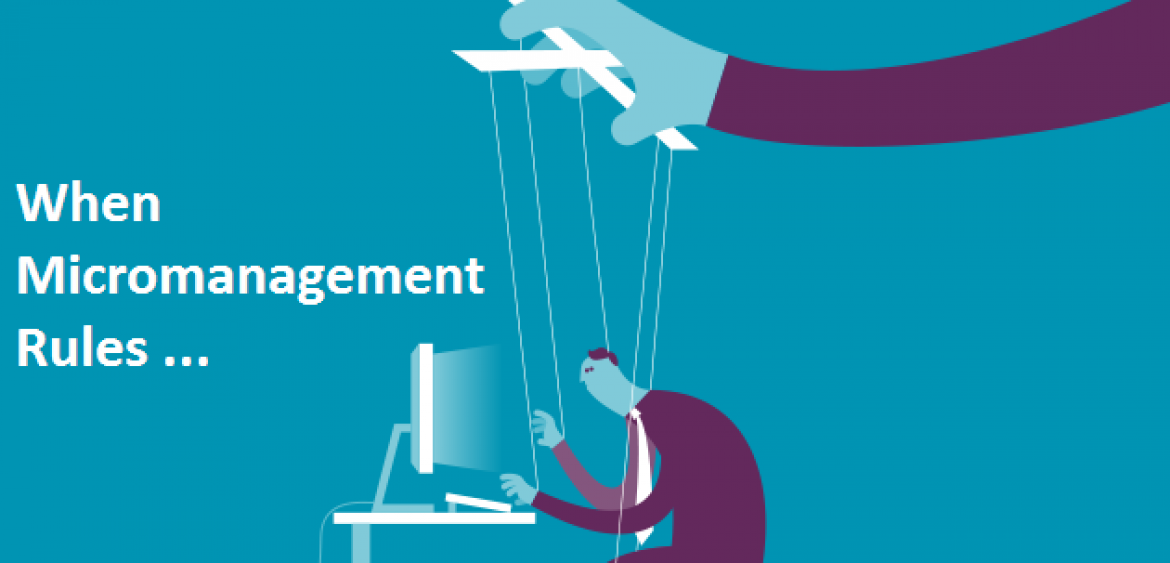I’m not a great cook, yet I’ve never killed anyone as far as I know!
One reason for my poor cooking skills is that earlier in my life I shared a kitchen with a chef who knew the right way to prepare and cook a dish and wouldn’t contemplate deviations. Immediate criticism and stern correction discouraged any experiments; so, I didn’t learn to cook with flair. I quickly learned to follow detailed instructions when Chef was there. When Chef was absent I ate basic food, uninspiring yet satisfactory; I survived!
Chef was a micromanager in the kitchen. Happily, for me, the kitchen wasn’t a central focus of my life and loss of skills and authority there didn’t cause general crisis of confidence. But a workplace is different; it consumes much of a person’s waking hours and is a unique location where people express their talent, develop professional skills, achieve career fulfilment and build general confidence.
It seems to me I see a lot of micromanaging in recent times. This surprises me, because micromanaging is an antithesis to devolving authority, enabling talent, cultivating creativity, stimulating productivity and generally making best use of staff resources – all the attributes of a good modern manager. Although it’s straightforwardly bad management, some people can’t help unwarranted meddling in processes and techniques that are properly the responsibility of a subordinate. Rather than just specify the output of the subordinate’s work, they seek also to determine and monitor exactly how it’s achieved. It’s a natural tendency for all that needs to be guarded against; for some, it’s a compulsion and maybe even addiction.
Micromanagers suck the energy out of a workplace and burn the candle of productivity at both ends. Their own productivity is diminished as they devote too much of their limited time or energy outside of their ‘real’ work. At the same time, the subordinate’s productivity and development are also diminished, because they learn not to use intuition or react with appropriate flexibility to new circumstances for fear of micromanaged reprimand.
To be the subject of micromanagement in a workplace is always deeply annoying and gets progressively more distressing. Fulfilment is absent; initiative is not welcomed and may be dangerous for the career; motivation is depressed; creativity is disabled. Working life for this employee is a drag. Increased levels of lethargy, apathy and stress result. It’s no wonder they say that people leave managers not companies.
That‘s no way to inspire great new chefs in training!
Why do micromanagers do it? Some say it’s a control thing deep-rooted in the psyche; the manager wants to control everything and is afraid of not knowing exactly what’s happening at all times. More deeply again, often the desire to control stems from lack of trust. The employee is presumed not to be sufficiently diligent or competent. The manager’s mindset is that others always make mistakes and need to be closely policed. All of this is well documented in management studies.
I’ve a hypothesis that micromanaging is more common in public service organisations where, more than elsewhere, reputation is often determined more by ability to ‘keep a clean sheet’ rather than achievement of productive output or results. As in many circumstances, lack of mission clarity makes for poorer management.
Micromanaging is a deep personality-based condition, which has many characteristics of addiction. There may be cures or correctives, but the addicts must first recognise it in themselves and want to change. Anyone for Micromanagers Anonymous?
posted in | Innovative Organisations







Sorry, the comment form is closed at this time.